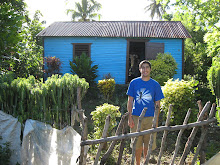So I am going to try to write here more often. This means I’m writing now, and has no influence on how often I may or may not write in the future. This entry might be the last one ever. Likely not true, but you can never tell. Among the volunteers here in la RD, there are 6 areas of work, or sectors: Youth, Health, Education (Special Ed and IT), Environment, Water and Business. Generally, business volunteers like myself (yes, ironic that I was assigned to this sector, but where else was I supposed to go? Health?) are placed in campos, or small villages, but nothing especially isolated, since we are usually assigned an organization or institution with which to work. By nature, we can’t live in cut off villages with no resources, because they also would lack organizations. Although my campo seems pretty out there (it is one of the poorest in the province, but the province itself is fairly rich), it is only a seven-minute motorcycle ride to the nearest town, fifteen minutes to the provincial capital, and a two-hour AC bus ride to Santo Domingo. Last weekend, I visited a few Water volunteer friends. The task of the water volunteer is daunting – find a water source and then create a gravity-fed system of tubes to bring running water down to the particular village in which they live. Unsurprisingly, these are small, isolated mountain villages with tiny populations. Most lack electricity as well as water, in addition to other services such as transportation infrastructure, local schools, and cell phone service. The volunteers must raise all of the money through grants and other means (Peace Corps itself does not supply funding), and interestingly are often unable to find money from the local or national government. Perhaps most daunting of all is organizing local Dominicans as workers on the project. [Any project we do in our sites must include local participation. Our understanding of development begins with a foundation of willing local populations. To arrive at a site, implement projects without any local input and leave is not only inefficient and unproductive, but also insulting to local customs, values, and intelligence. That being said, we often spend time with local leaders in discourse about the value of said projects that we believe are of importance.] In these villages where water volunteers live, the majority of the population is unemployed, getting by on only a subsistence level. Thus organized, daily work based on time-specific goals can be somewhat foreign, and compound construction difficulties. Nevertheless, obtaining running water (often potable, because the sources are from mountaintop springs or streams) in these villages can vastly improve quality of life. Visiting this kind of site was like visiting a different country, just like it is every time I go to the capital. The disconnect between the capital and where I live is enormous, and is even more so with these places. Interestingly, it looks like I might be turning into something of a water volunteer, if only helping coordinate the digging of a few wells around here. The tap water here is dirty and unreliable, so many people get it from the polluted river, catch it from the roof when it rains, or pay for it to be delivered. I am hoping that with these wells, people, mostly women, will spend less time and money looking for water for their families. Incidentally, I have learned to shower with about 2/3 of a gallon of water. Next week, I will be heading home for a nice-sized vacation. You may find me sitting on my parents’ couch with the remote, marveling at how pretty the picture is on the television and astounded at how many channels there are. Until next time, whenever that is. Si Dios quiere.
Also including a picture, because they look nice on here. This is me at another volunteer's site hiking up a river.



No hay comentarios.:
Publicar un comentario